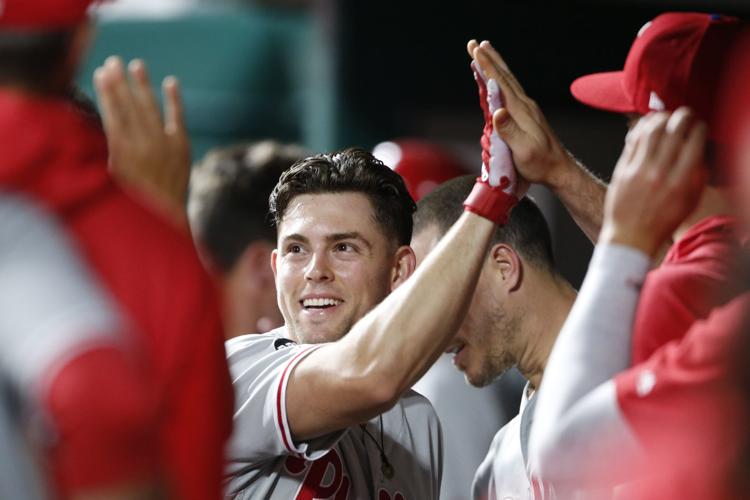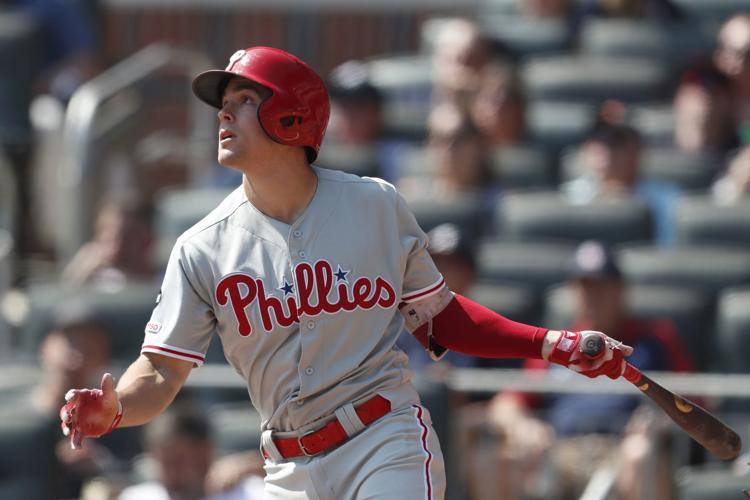Gabe Kapler, Scott Kingery’s manager with the Philadelphia Phillies, called the 2018 season — Kingery’s rookie campaign — a “reality check” for the former Arizona Wildcats star.
Kingery himself called it humbling.
And it was: a .226 batting average and 126 strikeouts in 452 plate appearances. A minuscule .267 on-base percentage, and a starting role that turned into a backup role, and sometimes barely that.
By the end of that first year, Kingery was worn down, his body frail from use at six positions, his mind twisted by doubt and second-guessing, his spirit sapped of its energy.
Now after a sophomore season that was better in just about every way, Kingery enters one of the most important chapters of his career.
Back in the good graces of the Phillies management and their fans, can Kingery seal the deal on his major-league future?
• • •
Up until last year, baseball had been just about a breeze for Kingery.
To be more accurate, up until Tax Day 2018, baseball had been a breeze.
After signing a six-year, $24 million contract with three additional club options — a record for a player with no major-league experience — Kingery opened his rookie season with a fury, collecting four hits in his first two games, another multi-hit game a week later, and his first home run April 9. A day later came his first career grand slam, and by April 14, he had a six-game hitting streak and some momentum on his side.
Then, the slide. After batting .280 in his first two weeks in the bigs, Kingery batted 2 for his next 30, and his average dropped below .215.
For the rest of the season, he hovered around .230s, finishing the year with a .226 batting average, eight home runs and 35 RBIs.
It was not the start he expected after batting nearly .400 in spring training.
“Really up until last year, I hadn’t really struggled,” Kingery said. “I went through the minors quickly, had a good college career. I’d never gone through a prolonged slump. I had to figure out how to get through that as a player. People say you don’t want to take it home with you, but it’s tough. Especially for me after getting that contract. There’s something you want to prove. You want to prove you deserve that contract, that you are the player you were before they gave us this huge deal. When you’re not playing at that level, it’ll eat at you.”
Kingery took his frustrations home with him.
He used to be able to shake off an oh-fer, reasoning with himself that he’d just collect three hits the next day. When those quick rebounds didn’t come, Kingery flailed.
“You’re at the top level, there’s nothing higher, and you’re struggling, the first time you’re struggling, and for me it was like, ‘Oh no, what’s going on?’ ” Kingery said. “For me, it was about finding the routine that would get me locked in for every game. Trying to find a way to flush last night’s game and come back with a good attitude.”
But it would take more than just slapping on a smile to snap Kingery from his funk.
• • •
Is it experience or success that takes a player to that next level?
Practice — or rather perfect practice — is the answer.
When Kingery came back for spring training this year, after having bulked up during the offseason during regular workouts with friend and former Arizona teammate Kevin Newman back in Scottsdale, Kingery felt like a new man. He was stronger, physically and emotionally, and he was ready to apply some advanced thinking to this baseball thing.
A year before, he felt bullied by pitchers.
“As a rookie, every time you step in the box you have some nerves, and they can tell,” he said. “There’s that sense of being a rookie in the box against a veteran guy. They know you’re a rookie and they can jump on you. Last year, I took a lot of first strikes, right down the middle, thinking I’d get more pitches to hit. That’s not the case. People saw me taking strikes down the middle, and it was like stealing a strike right away. One of the biggest things I’ve learned is being aggressive early in the count.”
Last year, Kingery said, “I was giving away a lot of at-bats.” This year, he values each trip to the plate as the opportunity it is.
“Last year a lot of times I was very frustrated after my first at-bat, and I still had two or three at-bats left,” he said.
“One thing I learned this year is your fourth at-bat might be the most important one you get in a game. You have to have that want to go up to the plate for a fourth or fifth time, regardless of how the first three went. That could be the at bat where your team is tied and you need a big hit here.”
This year, with a new approach at the plate and the confidence to use it, Kingery thrived.
He stormed out of the gate, batting .406 in April. He maintained a .300 average into July and drastically improved his power numbers, upping his home run total to 19 while displaying raw power that Kapler thinks is only a sign of things to come. Kingery finished the 2019 season with a .258 batting average, 55 RBIs and 15 stolen bases. His WAR (wins above replacement) of 3.0 was fourth on the team, behind stars J.T. Realmuto and Bryce Harper and ace Aaron Nola.
“It’s really unique to see that kind of power from someone who is that athletic in the dirt,” Kapler said. “He’s now a power threat and a guy who can hit in the middle of the lineup.”
• • •
Ask Newman, Kingery’s friend and former teammate, and he’ll tell you this was always part of the plan.
They met in late August at Philadelphia’s Citizen’s Bank Ballpark, though timing didn’t allow them much of a visit. They had spent some time together when the Phillies visited Newman’s Pittsburgh Pirates in late-July, but not enough. Both couldn’t wait to reunite during the offseason.
“It’s really, really cool and extremely unique,” Newman said of Kingery. “There are a handful of Wildcats (in the majors), but for a guy like Kingery and me: We went to Arizona together, we were roommates, drafted the same year, live in the same complex in Scottsdale, work out together. It’s really cool how it’s developed. To see his success is amazing.”
And fleeting — or so says Kingery.
“I was put in a lot of situations last season to make a person fail and grow at the same time,” he said.
“It wasn’t easy getting that contract, then being forced to learn six different positions at the big-league level. I cut myself a little bit of a break, because with the contract I have a little room for error. You have a little more faith in yourself — that if you screw up, they’re not going to send you right back down.”
No, Kingery has proven he belongs at the major-league level, and he’s going into this offseason intending to keep it that way.





